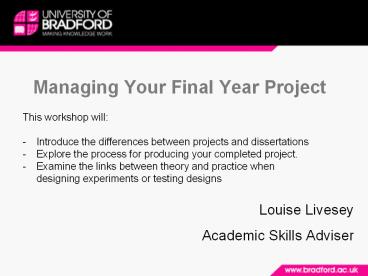Managing Your Final Year Project - PowerPoint PPT Presentation
1 / 16
Title:
Managing Your Final Year Project
Description:
Managing Your Final Year Project. Louise Livesey. Academic Skills Adviser. This workshop will: Introduce the differences between projects and dissertations – PowerPoint PPT presentation
Number of Views:219
Avg rating:3.0/5.0
Title: Managing Your Final Year Project
1
Managing Your Final Year Project
- This workshop will
- Introduce the differences between projects and
dissertations - Explore the process for producing your completed
project. - Examine the links between theory and practice
when designing experiments or testing designs
- Louise Livesey
- Academic Skills Adviser
2
Todays Plan
- Differences between dissertations and final
project reports - The process of producing a completed project
report or dissertation - Links between theory and practice for designing
experiments or testing designs - Tips for writing your final year project report
or dissertation
3
1.Differencesdissertations and final project
reports
- Generally speaking, if a
- report is required, answer an exploratory
question or hypothesis collecting evidence and
analysing it, or designing an item and testing
it and offering recommendations. Format
specified by the course and school. - dissertation is required, the research activity
will be in-depth and use of primary and secondary
sources fieldwork professional practice. An
extended essay with sections specified by the
course or school.
4
Stages of process
2.The process of producing a complete work
5
Activities in Agree Your Proposal
2.The process of producing a complete work
- Draw up your proposal
- Check with your supervisor
- Obtain Ethics Clearance
6
Activity 1 Activities in Choose a Research
?/Hypothesis
2.The process of producing a complete work
- More than one research ? To support the main
central ? e.g. - Consider the level of interest in and usefulness
of your research and availability, cost,
maintenance and storage of resources. - Create a list of key words
7
Activity 1 Activities in Reviewing the Literature
2.The process of producing a complete work
- Contact subject librarian
- Select most relevant texts
- Read carefully making notes
- Keep a list of everything you read
8
Activity 1 Activities in Implementing Research
2.The process of producing a complete work
- Identify the participants, equipment and other
resources required. - Design and create materials, and recording
documents and databases - Collect and collate data
- Keep accurate records.
9
Activity 1 Activities in First Draft
2.The process of producing a complete work
- Set your ideas in some sort of coherent form
- Write in bullet points then expanding to
sentences. - Sentences drawn together into paragraphs,
- Use visuals
- Do not worry about the reader they will never
see this version.
10
Activity 1 Activities in Revise, Edit and
Proofread
2.The process of producing a complete work
- Double the length of time you think it might take
you as a back-up. - Remind yourself of your central
question/hypothesis - Check the order of ideas and the flow
- Make sure your text is in an appropriately
academic style and contains subject specific
terminology. - Check your grammar, punctuation, spelling,
citations and references - Look in your module or programme handbook for any
format requirements
11
Activity 1 Activities in Final Draft submission
2.The process of producing a complete work
Hooray!
12
The Scientific Method
3.Links between theory and practice
13
4. Tips for writing
- Be brutal if you have left yourself only a
little time, write just the words you will use in
the word count. - Cover the basics try to make sure your sources
are off the reading list or are mentioned in
lecture materials. - If you cannot get hold of the recommended
sources, at least use current ones (where
appropriate). - Answer. The. Question. Or. Brief. (even if it is
yours) - Still allow some time for attention to detail
because poor referencing, punctuation, and
formatting can be costly in terms of marks.
14
References
Birmingham Law School. How to Write a Research
Proposal. Birmingham University of Birmingham.
online Available at http//www.birmingham.ac.u
k/schools/law/courses/research/research-proposal.a
spx Accessed 2.10.2014 Cottrell, S. (2013).
The Study Skills Handbook. 4th ed. Basingstoke
Palgrave Macmillan Ltd. Tomato Sphere. (2014)
The Scientific Method. Canada Lets Talk Science
online Available at http//www.tomatosphere.org
/teacher-resources/teachers-guide/principal-invest
igation/scientific-method.cfm Accessed
3.10.2014 Wisker, G. (2009) The Undergraduate
Research Handbook. Basingstoke Palgrave
Macmillan Ltd.
15
Academic Skills Advice
- Where are we? Chesham Building B0.23
- What do we do? Support undergraduate students
with their academic skills by running clinics and
workshops, having bookable appointment slots, and
enabling students to drop-in for Instant Advice. - Who are we? Michael and Helen specialise in Maths
Support Lucy and Russell advise students on
study skills and I (Louise) deliver the
workshops - When can you come for help? Everyday both face to
face and on-line - How do I get in touch? Email academic-skills_at_brad
.ac.uk or website www.brad.ac.uk/academic-skills
16
Any questions?































